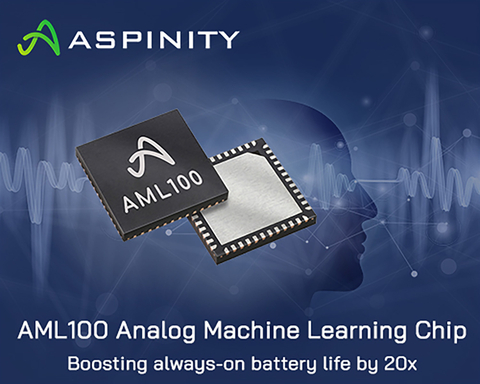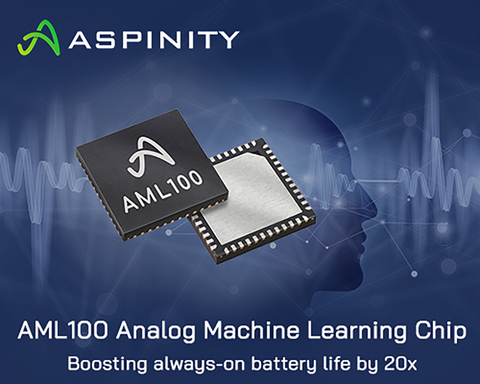PITTSBURGH--(BUSINESS WIRE)--Aspinity, the pioneer in analog machine learning chips, today launched the first member of its analogML family, the AML100, which is the industry’s first and only tiny machine learning (ML) solution operating completely within the analog domain. As such, the AML100 reduces always-on system power by 95%, allowing manufacturers to dramatically extend the battery life of today’s devices or migrate walled powered always-on devices to battery - opening whole new classes of products for voice-first systems, home and commercial security, predictive and preventative maintenance, and biomedical monitoring.
Minimizing the quantity and movement of data through a system is one of the most efficient ways to reduce power consumption, but today’s always-on devices don’t have that capability. Instead, they continuously collect large amounts of natively analog data as they monitor their environment and digitize the data immediately, wasting tremendous system power processing data that are mostly irrelevant to the application. In contrast, the AML100 delivers substantial system-level power-savings by moving the ML workload to ultra-low-power analog, where the AML100 can determine data relevancy with a high degree of accuracy and at near-zero power. This makes the AML100 the only tinyML chip that intelligently reduces data at the sensor while the data is still analog and keeps the digital components in low power mode until important data is detected, thereby eliminating the power penalty of digitization, digital processing, and transmission of irrelevant data.
“We’ve long realized that reducing the power of each individual chip within an always-on system provides only incremental improvements to battery life,” said Tom Doyle, founder and CEO, Aspinity. “That’s not good enough for manufacturers who need revolutionary power improvements. The AML100 reduces always-on system power to under 100µA, and that unlocks the potential of thousands of new kinds of applications running on battery.”
Inside the AML100
The heart of the AML100 is an array of independent, configurable analog blocks (CABs) that are fully programmable within software to support a wide range of functions, including sensor interfacing and ML. This versatility delivers a tremendous advantage over other analog approaches, which are rigid and only address a single function. The AML100, however, is highly flexible, and can be reprogrammed in the field with software updates or with new algorithms targeting other always-on applications.
The precise programmability of the AML100’s analog circuits also eliminates the chip-to-chip performance inconsistencies typical of standard analog CMOS process variation, which has severely limited the use of highly sophisticated analog chips, even when the inherent low power of analog makes it better suited for a specific task.
Key Features of the AML100
- Consumes less than 20µA when always-sensing
- Intelligently reduces quantity of data by up to 100x while the data are still in analog
- Features field-programmable functionality to address a wide range of always-on applications
- Leverages patented analog compression technology for preroll collection to maintain accuracy of wake word engine in voice-enabled devices
- Supports 4 analog sensors in any combination (microphones, accelerometers, etc.)
- Available in 7mm x 7mm 48-pin QFN package
Availability
Aspinity’s AML100 is currently sampling to key customers with volume production planned for Q4 2022. Customers can evaluate the AML100’s capabilities by purchasing one of Aspinity’s integrated hardware-software evaluation kits: EVK1 for glass break and T3/T4 alarm tone detection or EVK2 for voice detection with preroll collection and delivery. Contact Aspinity about evaluation kits with software packages for other applications. For more information, download the AML100 product brief or contact Aspinity.
About Aspinity
Aspinity is the world leader in the design and development of analog processing chips that are revolutionizing the power- and data-efficiency of always-on sensing architectures. By delivering highly discriminating analog event detection, Aspinity’s ultra-low power, trainable and programmable analog machine learning (analogML) core eliminates the power penalty of moving irrelevant data through the digital processing system, dramatically extending battery life in consumer, IoT, industrial and biomedical applications.
For more information on Aspinity, stay in touch on LinkedIn and Twitter: @aspinity, email: info@aspinity.com or visit https://Aspinity.com.




